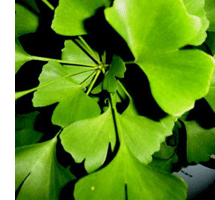 More than 40 components of ginkgo have been identified but only two are believed to be responsible for the herb's beneficial effects -- flavonoids and terpenoids. As described earlier, flavonoids (such as quercetin) have potent antioxidant effects. Laboratory and animal studies have shown that flavonoids protect the nerves, heart muscle, and retina from damage. Terpenoids (such as ginkgolides) improve blood flow by dilating blood vessels and reducing the stickiness of platelets.
More than 40 components of ginkgo have been identified but only two are believed to be responsible for the herb's beneficial effects -- flavonoids and terpenoids. As described earlier, flavonoids (such as quercetin) have potent antioxidant effects. Laboratory and animal studies have shown that flavonoids protect the nerves, heart muscle, and retina from damage. Terpenoids (such as ginkgolides) improve blood flow by dilating blood vessels and reducing the stickiness of platelets.
In studies, Ginkgo Biloba has been reported as demonstrating anti-oxidant abilities with improvements of the platelet and nerve cell functions and blood flow to the nervous system and brain. It has also been reported as reducing blood viscosity. Its ability to increase vascular dilation may help reduce retinal damage due to macular degradation and may reverse deafness caused by reduced blood flow.
Antioxidants are substances that scavenge free radicals - damaging compounds in the body that alter cell membranes, tamper with DNA, and even cause cell death. Free radicals occur naturally in the body, but environmental toxins (including ultraviolet light, radiation, cigarette smoking, and air pollution) can also increase the number of these damaging particles. Free radicals are believed to contribute to a number of health problems including heart disease and cancer as well as Alzheimer's disease and other forms of dementia. Antioxidants such as those found in ginkgo can neutralize free radicals and may reduce or even help prevent some of the damage they cause.
In addition, ginkgo is sometimes used preventively because it may delay the onset of AD in someone who is at risk for this type of dementia (for example, family history).
The flavonoids found in ginkgo may help halt or lessen some retinal problems (that is, problems to the back part of the eye). Retinal damage has a number of potential causes, including diabetes and macular degeneration. Macular degeneration (often called age-related macular degeneration or ARMD) is a progressive, degenerative eye disease that tends to affect older adults and is the number one cause of blindness in the United States . Studies suggest that gingko may help preserve vision in those with ARMD.
Because ginkgo is reputed to improve blood flow, this herb has been studied in people with intermittent claudication (pain caused by inadequate blood flow [atherosclerosis] to the legs). People with intermittent claudication have difficulty walking without suffering extreme pain. In fact, ginkgo has been shown to be as effective as a leading medication in improving pain-free walking distance. However, regular walking exercises are more beneficial than ginkgo in improving walking distance.
Given that nerve damage and certain blood vessel disorders can lead to tinnitus (the perception of ringing, hissing, or other sound in the ears or head when no external sound is present), some researchers have investigated whether ginkgo relieves symptoms of this hearing disorder. Although the quality of most studies was poor, the reviewers concluded that ginkgo moderately relieves the loudness of the tinnitus sound. However, a recent well-designed study including 1,121 people with tinnitus found that ginkgo (given 3 times daily for 3 months) was no more effective than placebo in relieving symptoms of tinnitus. After these conflicting findings, the therapeutic value of ginkgo for tinnitus remains uncertain. In general, tinnitus is a very difficult problem to treat.
In addition to these health problems, professional herbalists may also recommend ginkgo for a variety of other ailments including altitude sickness, asthma, depression, disorientation, headaches, high blood pressure, and vertigo.
Ginkgo Concerns & Researches >>>

